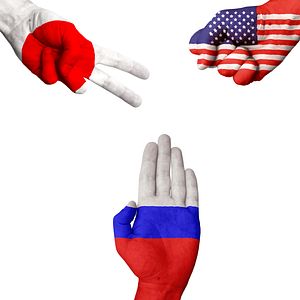Russia began military drills on the Kuril Island chain just off its far eastern peninsula of Kamchatka on Tuesday. The drills are happening in tandem with Russia sending an aid convoy into eastern Ukraine, which some are calling a pretext to invasion. The two actions have alarmed Ukraine’s Western backers and Japan. While the drill in the Kurils is relatively small scale, it is a further blow to already deteriorating relations with Tokyo, which had hoped to come to an agreement with Russia over the disputed islands that Japan refers to as the Northern Territories. Russia appears intent on sending another message to the countries allied against it, after its most recent round of retaliatory sanctions on Western imports. However, Russia’s drill in the Kuril Islands is less incendiary, and could reflect Japan’s own wish to limit the damage to their relationship caused by Ukraine.
Russian President Vladimir Putin announced on Monday that a Moscow “in collaboration with representatives of the International Committee of the Red Cross, is sending an aid convoy to Ukraine,” Reuters reported, without stating where the convoy was headed. As Ukrainian forces are encircling pro-Russian enclaves in the east, Kiev also warned that Russia has 45,000 troops along their shared border. NATO also said “there was a ‘high probability’ that Moscow could intervene militarily in the country’s east.” U.S. President Barack Obama said any intervention by Russia without Ukraine’s consent would be a violation of international law and “unacceptable,” while in a European Commission statement, President Jose Manuel Barroso warned against “any unilateral military actions in Ukraine, under any pretext, including humanitarian.”
With such a volatile situation unfolding along its western border, it is curious that Russia is at the same time conducting military drills on its far eastern frontier that are sure to provoke the West’s ally, Japan. However, the size of the drill helps give this context. Russia’s Eastern Military District spokesman Colonel Alexander Gordeyev said “more than 1,000 troops, five Mi-8AMTSh attack helicopters and 100 other pieces of military hardware would be involved,” which is not so much a display of power, as it is a reminder of who controls the territory. Additionally, Russia did not say whether the drills were happening on any of the four islands disputed with Japan. A Japanese foreign ministry official responded by saying that if the drill was being conducted on one of those islands, “we can by no means accept that in light of Japan’s stance on the islands.”
While both the aid convoy and the military drill are designed to send a message to Ukraine and its Western allies, they are not equal. Sending a Russian aid convoy into disputed territory with ongoing fighting, while amassing troops on its nearby border, is a stark message to the West that Russia’s strategic interest in Ukraine will not be given up easily, and that Moscow is willing to take actions that could plunge Ukraine into further chaos.
Russia’s action on its eastern border reflect a much less tense situation. Japan’s latest sanctions on Moscow require a response, yet just as Tokyo’s sanctions are much weaker than those imposed by the U.S. or E.U., Russia does not want to do anything that could jeopardize a return to negotiations if and when the situation in Ukraine stabilizes. Japan and Russia continue to show an unwillingness to allow the Ukrainian problem to fundamentally harm the possibility of talks on energy trade and a resolution to their island dispute at a later date. However, should Russia decide it cannot concede its influence in Kiev, or at least eastern Ukraine through proxy governments run by ethnic Russians, then the waiting game being played on its eastern border will be postponed indefinitely, as Japan would almost certainly side with the U.S. and its allies.
































